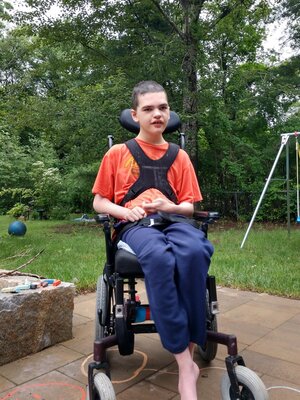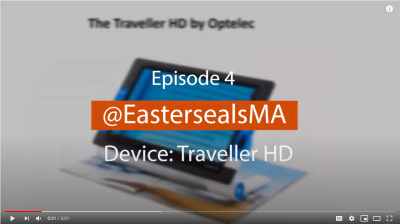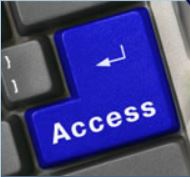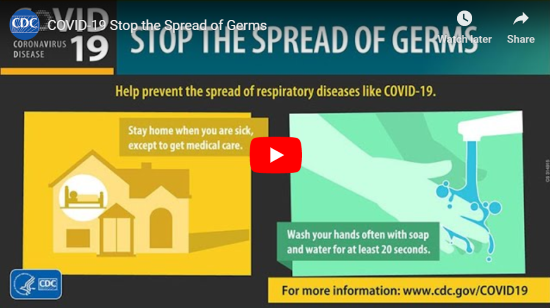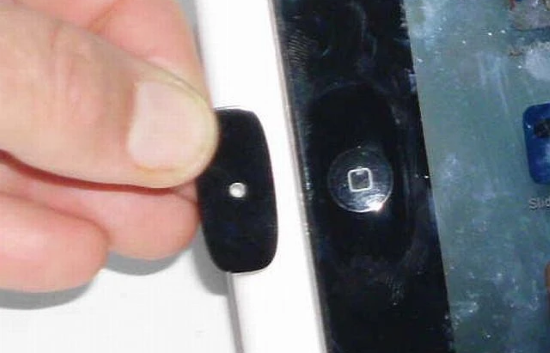MassMATCH thanks Easterseals MA and the Southeast Center for Independent Living (SCIL) for partnering with us to create the Empowering Choices initiative.
It’s hard to be in charge of your life when your finances feel out of your control. Getting to a place with choices and greater independence can be a long climb — one that’s particularly steep if you’re living on a limited income with a disability and the equipment you need is out of reach.
That’s why in 2018 the Massachusetts Rehabilitation Commission (MRC) — the umbrella agency to the MassMATCH program — applied to the federal Administration for Community Living (ACL) to fund “Empowering Choices.” The grant-funded project would expand opportunities for financial literacy training and provide an easier way to finance assistive technology.
Funded in 2019, the Empowering Choices initiative created two new resources that can help individuals with disabilities in Massachusetts achieve their goals and acquire tools needed for independence. They are:
1. Financial Literacy Training
How do I make a budget? How do I avoid scams and identity theft? Is this purchase a want or a need? What is credit, anyway?
These are among the popular topics included in Budget Your Bucks trainings offered by the Southeast Center for Independent Living. SCIL has been providing the 6-week Budget Your Bucks training series for a number of years and Empowering Choices made possible curriculum revisions for, and outreach to, the low-income and diverse communities of Fall River and New Bedford.
The impact has been measurable
52 individuals with disabilities from Fall River and New Bedford participated in Budget Your Bucks during the grant-funded period. 45% improved their financial literacy scores, and those with the lowest initial scores saw their scores improve an average of 23.5%. An impressive 87% completed the 6-week series (and earned a Walmart gift card and certificate of completion).
SCIL also provided financial literacy training to 130 youth through their Youth Transition Programs. The trainings were carried out at area high schools and at a workshop at the annual Youth Leadership Forum.
“And they were so proud when they finished!” reflects Heidi Collins, SCIL Program Director.
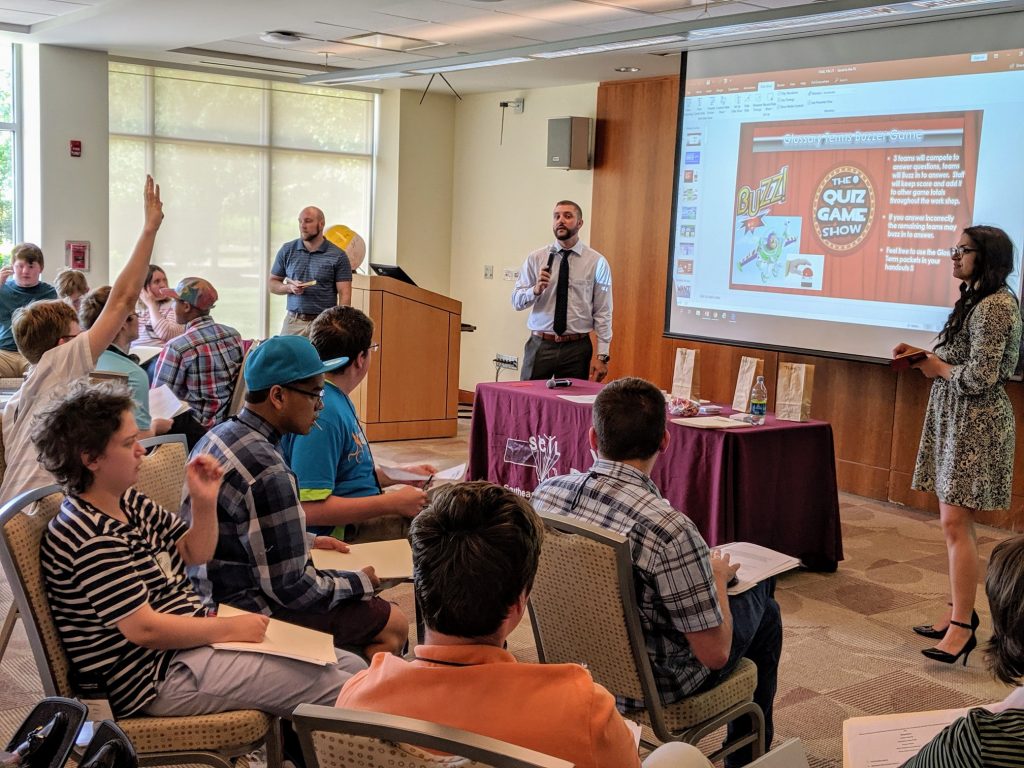
SCIL presents at the Youth Leadership Forum
Since then, outreach conducted in the Fall River and New Bedford communities has continued to pay off. SCIL has been invited to provide Budget Your Bucks at a behavioral health center and a public housing development. The local domestic violence shelter is now also making regular referrals.
“We’re seeing participants learn from each other, not only the curriculum. One woman in shelter got into subsidized housing. They help each other. It’s powerful to see,” emphasizes Collins.
Feedback from participants has been overwhelmingly positive: improved banking habits, better checking account balances, comparison shopping. Some report following a monthly budget and cutting out unnecessary spending such as eating out often.
“One woman used the spending tracker tool, stopped bringing takeout coffee and bought herself a coffee pot. Another saved for a vehicle so she could get a better job,” Collins says.
Another exciting result? Financial literacy training will soon be available statewide. The curriculum has been shared with all the Massachusetts Independent Living Centers (ILCs) and SCIL has provided training on its components.
“We’re delighted to see Empowering Choices take off in this way,” says Ann Shor, Director of Assistive Technology and Independent Living Programs at MRC. “Working together, we can make these resources available to so many more communities.”
2. Mini Loan Program
The second resource made possible by Empowering Choices is a new affordable way to purchase assistive technology: the zero-interest Mini Loan Program.
The Mini Loan is a new offering of the Alternative Finance Program that MassMATCH partner, Easterseals MA, has managed for years. What makes the Mini Loan Program different is a zero-interest rate, loan amounts ranging from just $100 to $2,000, and a very fast turn around from application to check in hand. Best of all? Persons with low credit scores or no credit history are encouraged to apply.
“We wanted to create an affordable way for people to buy the assistive technology they need as well as a way to improve their credit scores,” reflects Steven Crays, Coordinator of the Alternative Finance Program at Easterseals MA. “Instead of using a banking partner, Easterseals MA is the direct lender. This gives us more flexibility and speeds up the process considerably.”
A handful of loans have been made to date, so help us get the word out! Each has had a profoundly positive impact on the life of the applicant. They include:
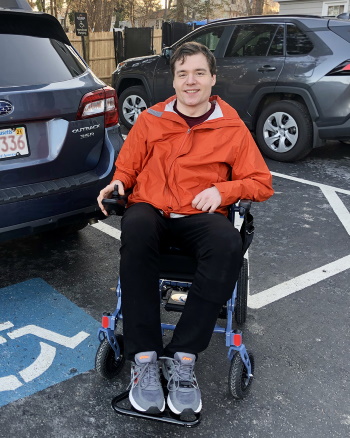
Dan Moore with his new wheelchair
- An elderly woman who’d felt trapped at home when her condition worsened, now gets out and about thanks to the financing of a $1,800 ramp.
- A high school graduate with autism is financing the computer he needs for college and building credit for adulthood.
- A woman whose husband had a stroke has financed a unique stairlift wheelchair so she can safely move him in an emergency.
And then there’s Dan who has multiple sclerosis as well as college and medical debt.
“I still can’t quite believe how easy it was to get help from Easterseals MA and their ‘Mini-Loan’ program for assistive technology [….] Before I knew it, I had a check in hand that would cover the lion’s share of my wheelchair expense. [The loan terms] meant the difference between me getting the technology I needed and being housebound.” — Dan Moore (read Dan’s story)
Do You Know Someone Who Could Use Empowering Choices?
One lesson learned from this project is the power of word-of-mouth from trusted neighbors. We can put out the message on social media and spread flyers with local organizations, but nothing is as effective as hearing directly from one another.
To better reach the communities of Fall River and New Bedford, the Empowering Choices initiative created Community Ambassadors. These were individuals trained on the offerings of the program who came from within these communities. Community Ambassadors attended events and community gatherings to “talk up” Budget Your Bucks and MassMATCH services. One of the Ambassadors had previously completed Budget Your Bucks herself, and while serving as a Community Ambassador saved up for a car, improving her capacity to get around the neighborhood. This is the sort of success that sells a program!
As a member of our MassMATCH community: who do you know who could benefit from a zero-interest loan to purchase technology? Who do you know who could use financial literacy education?
Contact:
The Alternative Finance Program at Easterseals MA to learn about financing AT.
Your local Independent Living Center and ask about financial literacy training.
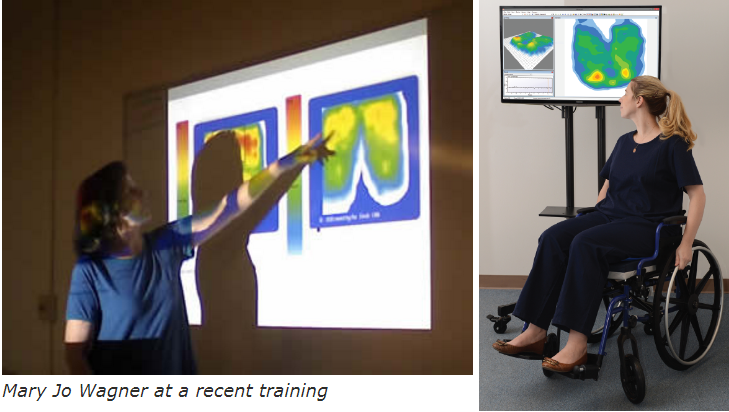 Presented by:
Presented by:
